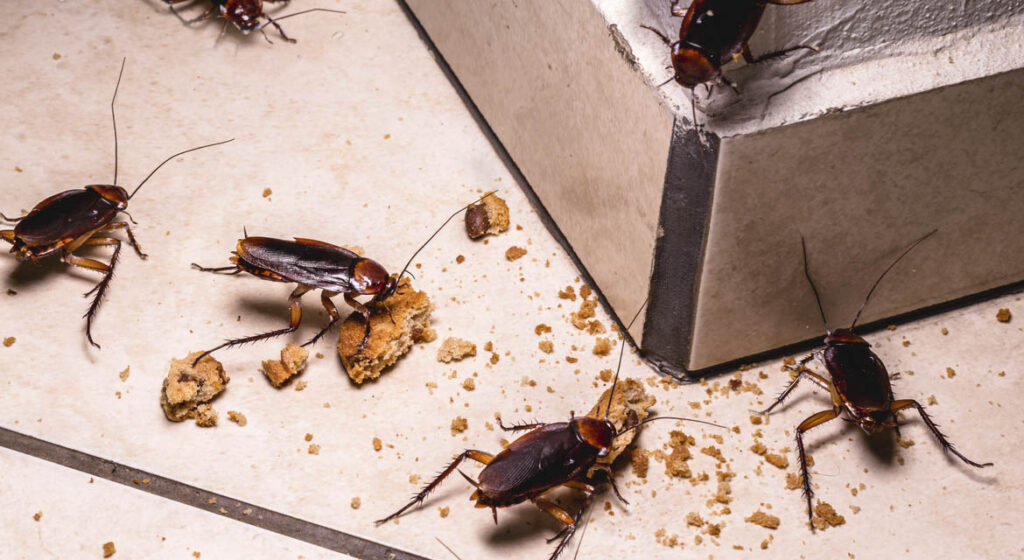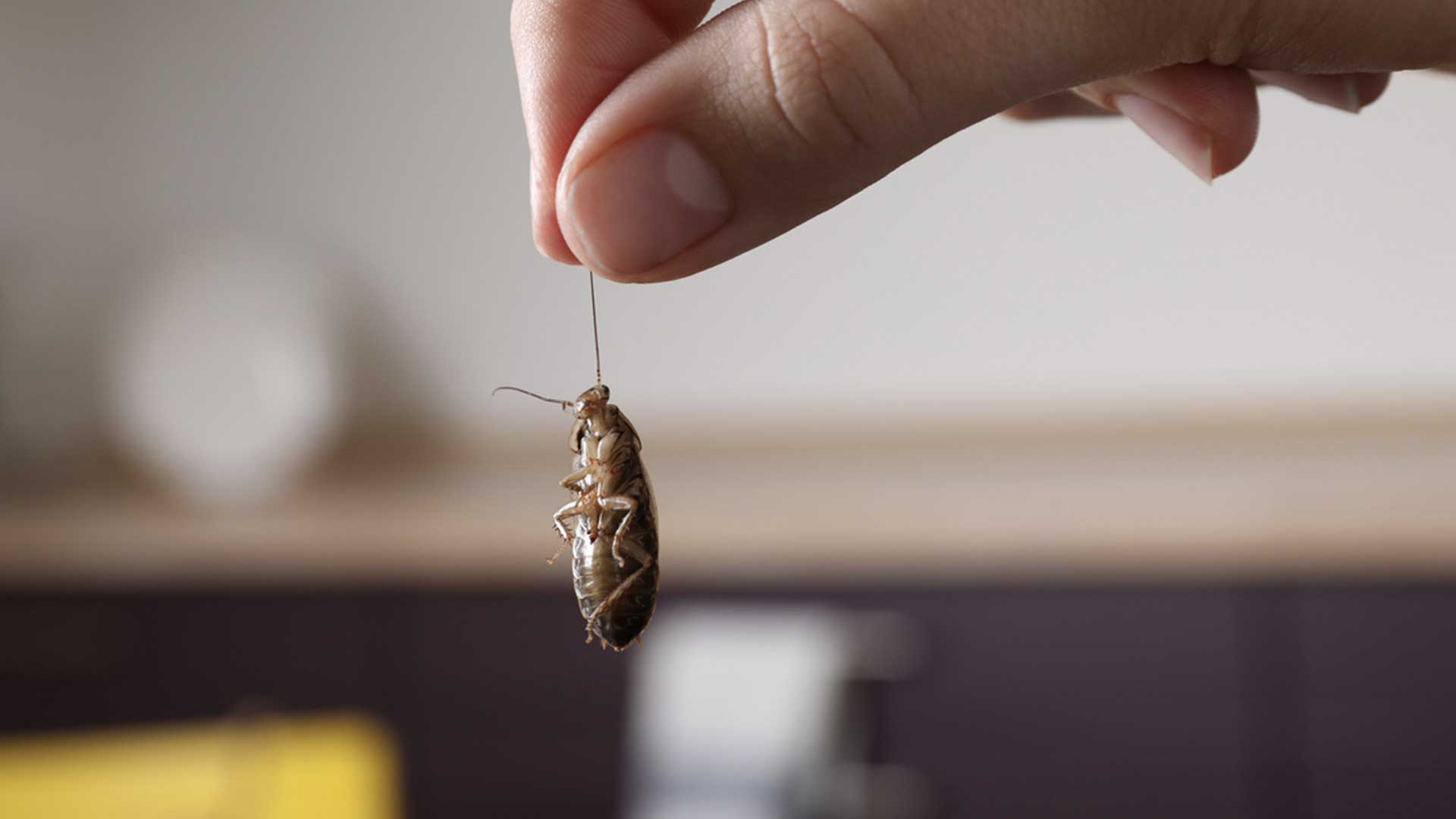
Are Cockroaches Dangerous?
Cockroaches are a health hazard as they spread diseases and bacteria, potentially causing illnesses such as diarrhea, dysentery, and food poisoning. Additionally, their allergens can trigger allergies and worsen asthma symptoms, while their presence often indicates a larger infestation issue due to rapid reproduction and potential structural damage. Here are three key points to keep in mind:
- Cockroaches pose health risks by spreading diseases and bacteria, potentially leading to illnesses like diarrhea, dysentery, and food poisoning.
- Cockroach allergens can trigger allergic reactions and worsen asthma symptoms, particularly in individuals who are susceptible to these conditions.
- Besides causing structural damage, cockroaches indicate a larger infestation problem due to their rapid reproduction and tendency to congregate in large numbers.
Cockroach Overview
Cockroaches are one of the most common pests found in homes and commercial buildings worldwide. The most common cockroach species found in homes and commercial buildings are the German cockroach, American cockroach, and Oriental cockroach. They are nocturnal creatures that love to hunt for food in warm and moist environments. But with their beady eyes, scurrying legs, and the way they can seemingly fit through any tiny crevice, many people find them downright disgusting.
Beyond their unappealing appearance, the question remains: are cockroaches dangerous?
That’s not quickly answered with a ‘yes’ or ‘no,’ but with more detailed information that can help you identify cockroach issues and infestations and take steps to exclude and eliminate them from your home. Let’s explore the risks surrounding cockroaches.
Cockroaches Can Spread Pathogens
One of the main concerns with cockroach infestations is the potential health hazards they pose. Cockroaches are known to spread bacteria, which can lead to various illnesses in humans. Cockroaches live in unsanitary conditions and feed on decaying matter, garbage, and sewage. These food sources are loaded with various types of bacteria, and as a result, cockroaches become carriers of these harmful microorganisms.
Cockroaches carry bacteria within their digestive systems, and as they move around, they deposit fecal matter and shed their skin. Cockroach feces can contain dangerous bacteria such as E. coli and Salmonella, which can cause illnesses ranging from mild gastroenteritis to more severe conditions such as typhoid fever and sepsis. These bacteria can be transmitted to humans when they come into contact with surfaces contaminated with cockroach feces or when they accidentally ingest particles of feces or saliva that have become airborne.
Similarly, when cockroaches shed their skin, it can accumulate in the air and on surfaces, posing another risk of transmitting harmful bacteria. Cockroaches can also carry bacteria on their bodies, such as Staphylococcus and Streptococcus, which can cause skin infections such as impetigo and cellulitis. Cockroaches can also spread viruses that cause polio, hepatitis, and gastroenteritis. These viruses can be easily transmitted through contaminated food and surfaces and are especially dangerous for elderly or immunocompromised individuals.

Truly Nolen GUARANTEE
If you’re not completely satisfied, you’ll get a full refund on your most recent service with our 100% money back guarantee.

$50 Off Year Round Pest Control
Truly Nolen is a family-owned company with 85 years of experience providing the best pest control. If you’re not completely satisfied, you’ll get a full refund on your most recent service with our 100% money back guarantee.
In addition to bacteria and viruses, cockroaches carry parasitic pathogens such as protozoa and worms. These parasites can cause illnesses, including dysentery, giardiasis, and tapeworm infections. Moreover, cockroaches have an affinity for human food and can easily contaminate surfaces, utensils, and food items. They walk over dirty surfaces, such as garbage cans and sewage pipes, and transfer harmful bacteria to any surface or food source they contact. Cockroach-infested kitchens and pantries are often rife with dangerous pathogens, so it is essential to ensure proper sanitation and hygiene practices in these areas.
To prevent the spread of disease, it is essential to maintain good hygiene practices, keep your home clean and tidy and seal any gaps or cracks that can allow cockroaches to enter your home. In case of a cockroach infestation, seek our professional pest control services to ensure proper removal and sanitation measures are taken.
Respiratory Issues Caused by Cockroaches
Cockroaches are not only a nuisance and an unsightly presence in the home, but they can also cause respiratory reactions ranging from mild to severe. For people who are already prone to allergies or asthma, cockroaches can make these conditions worse and trigger a range of symptoms.
The danger with cockroaches lies in their body parts, saliva, and feces. These contain allergens that can become airborne and trigger allergies when inhaled. When cockroach allergens enter the body, the immune system reacts, and symptoms like sneezing, watery eyes, and nasal congestion occur. In some people, especially those with severe allergies, these symptoms can worsen, leading to breathing difficulties and asthma attacks.
Allergic reactions caused by cockroaches are more common in urban areas, where they are widespread and can infest homes and buildings. Children and older adults are also more vulnerable to these allergens, and their immune systems may be less effective at coping with them. In some cases, exposure to cockroach allergens can even lead to the development of new allergies.
The severity of allergic reactions caused by cockroaches varies from person to person. While some may only experience mild symptoms, others may develop severe and life-threatening reactions. Therefore, it is advisable to seek medical attention immediately if the symptoms persist or worsen.
To reduce the chances of encountering cockroach allergens, it is crucial to maintain a clean and hygienic living environment. By understanding the dangers and taking steps to prevent infestations, we can protect ourselves and our loved ones from the harmful effects of these pests.
Roach Bite Allergies
Roaches have been known to bite humans, often when their preferred food sources are scarce. These bites are usually small and painless, but they can lead to an allergic reaction in some people. Symptoms of a roach bite allergy may include redness, itching, and swelling around the bite area, hives, and in some cases, anaphylaxis. Anaphylaxis is a severe allergic reaction that can lead to difficulty breathing, swelling of the throat, and a drop in blood pressure that can be life-threatening.
It is important to note that not all individuals who are bitten by a roach will have an allergic reaction. However, those who are allergic can have a severe reaction that requires immediate medical attention. In addition, roaches can leave behind allergens in their saliva and feces, triggering allergic reactions even without a bite.
To prevent roach bite allergies, taking steps to eliminate roaches from the home is essential. This includes regular cleaning to remove food spills and crumbs, proper storage of food in sealed containers, and regular inspections of potential entry points, such as cracks in walls or baseboards. It is also important to keep the home dry and well-ventilated to prevent the buildup of moisture, which can attract roaches.
If you suspect that you or someone in your household may have a roach bite allergy, it is crucial to seek medical attention immediately. An allergist can perform testing to identify the specific allergen causing the reaction and provide recommendations on how to manage and/or avoid exposure to that allergen. By taking preventative measures and seeking medical attention when necessary, we can help protect ourselves from these harmful pests.

$50 Off Year Round Pest Control
Truly Nolen is a family-owned company with 85 years of experience providing the best pest control. If you’re not completely satisfied, you’ll get a full refund on your most recent service with our 100% money back guarantee.
Other Health Concerns
Cockroach infestations can also affect mental health and well-being. The presence of cockroaches in the home can lead to anxiety, stress, and sleep disturbance. In some cases, people may feel ashamed or embarrassed about having a cockroach infestation and may avoid inviting friends or family over.
One of the most concerning issues is the possibility of a cockroach entering your ear canal. While this is a rare occurrence, it can happen and can be distressing. Cockroaches are attracted to small, dark spaces, including the ear canal. If a cockroach does happen to crawl into your ear, it can cause a lot of discomfort and even pain. The sensation of something moving and scratching inside your ear can be quite scary and can even result in panic attacks.
In addition to the discomfort, a cockroach in your ear canal can also pose a risk to your health. Cockroaches can carry a range of bacteria, viruses, and parasites that can be transmitted to humans. A cockroach entering your ear could potentially deposit harmful pathogens, leading to infection and other health complications.
If you suspect that a cockroach has entered your ear canal, it’s important to seek immediate medical attention. Do not attempt to remove the cockroach yourself, as this can cause further damage to your ear. A medical professional will have the tools and expertise to safely remove the cockroach and assess any potential damage.
Identifying a Cockroach Infestation
If you see roaches or hear skittering under your baseboards and appliances, it’s a good sign that you’ve got a roach problem. But what kind of roaches do you have?
The German cockroach (Blattella germanica) is one of the most common household pests. They are small, tan, or light brown and have two black stripes on their backs. While German roaches do not usually bite humans, they may bite if they feel threatened.
The American cockroach (Periplaneta americana) is another common species of cockroach that may bite humans. They are larger than German cockroaches, with a reddish-brown color and a yellowish figure-eight pattern on their backs.
The Oriental cockroach (Blatta orientalis) is a dark brown or black cockroach often found in damp areas of homes, such as basements or crawl spaces. Oriental cockroach bites are not common, but they can be painful and may cause a rash or infection.
Brown-banded cockroaches (Supella longipalpa) are small, light brown, or tan cockroaches that have distinctive bands across their wings. They are usually found in warmer climates and are not as common in households as other species of roaches. Brown-banded cockroaches are not known to bite humans.
Calling In the Professionals
If you suspect you’ve got a cockroach infestation, there’s no time to waste taking care of it. While DIY methods like roach motels can work to some extent, there’s no substitute for the expertise of a professional. Our Truly Nolen technicians are trained and experienced in dealing with cockroaches and can help you with an elimination and exclusion plan that will keep your property roach-free now and in the future. Don’t delay; contact your local Truly Nolen office to get started.

$50 Off Year Round Pest Control
Truly Nolen is a family-owned company with 85 years of experience providing the best pest control. If you’re not completely satisfied, you’ll get a full refund on your most recent service with our 100% money back guarantee.
Frequently Asked Questions
How do I know if I have a cockroach infestation?
Signs of a cockroach infestation include the presence of live or dead roaches, their droppings (resembling small black or brown specks), egg casings, a musty odor, and greasy smear marks along walls or surfaces.
Are cockroaches dangerous?
Cockroaches can pose health risks as they can contaminate food and surfaces with bacteria, pathogens, and allergens. They have been associated with respiratory issues, allergies, and the spread of diseases such as salmonella. Learn more about cockroaches
How can I prevent cockroach infestations?
Prevention measures include keeping a clean and sanitary environment, sealing cracks and gaps in walls, floors, and around pipes, storing food in sealed containers, promptly fixing any moisture issues or leaks, and regularly disposing of garbage in sealed bins. Learn More!
Can I get rid of cockroaches on my own?
DIY methods can help manage small cockroach infestations, but larger or persistent infestations often require professional assistance. Pest control professionals have the knowledge, experience, and specialized treatments to effectively eliminate roaches.
How long does it take to get rid of a cockroach infestation?
The duration of cockroach control can vary depending on the severity of the infestation, the species involved, and the effectiveness of the treatment. It typically takes several weeks to completely eliminate a roach infestation, but ongoing monitoring and preventive measures are important for long-term control.

